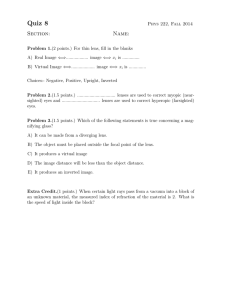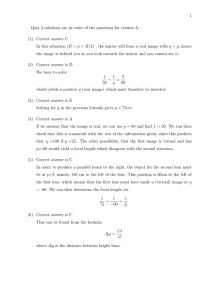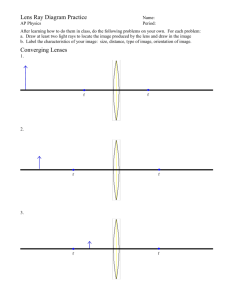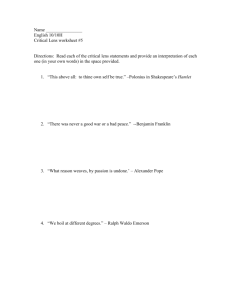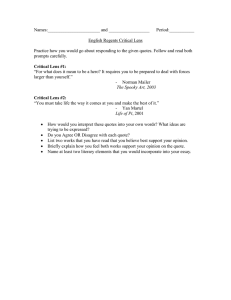Physics 2130 Final Examination Spring 2006 1
advertisement
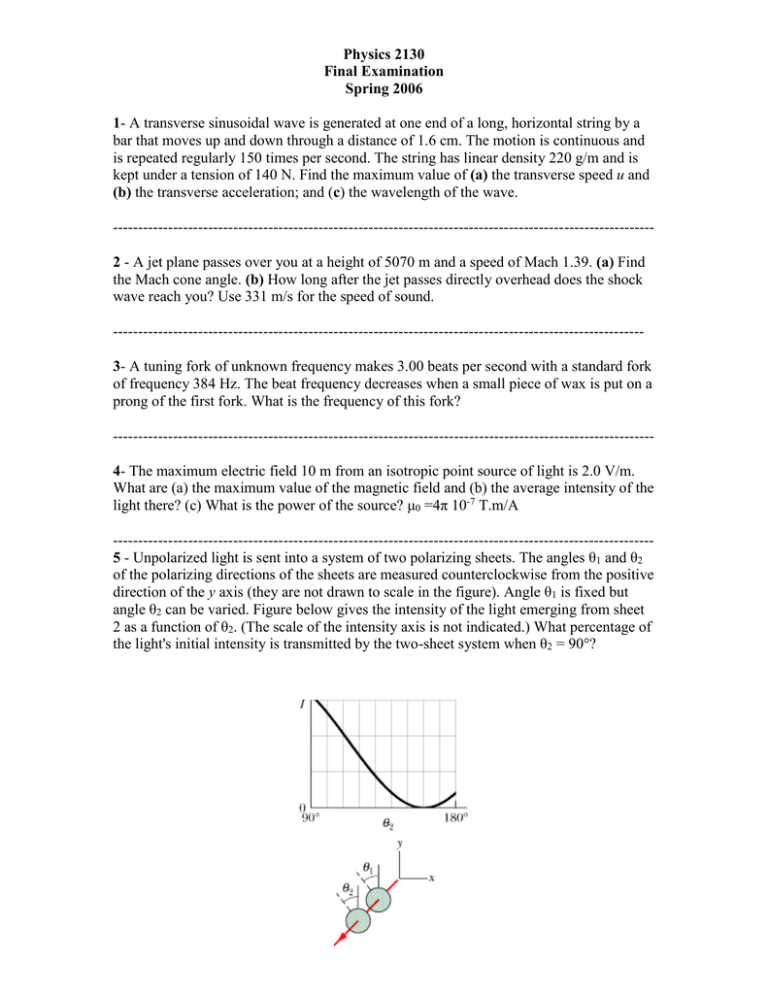
Physics 2130 Final Examination Spring 2006 1- A transverse sinusoidal wave is generated at one end of a long, horizontal string by a bar that moves up and down through a distance of 1.6 cm. The motion is continuous and is repeated regularly 150 times per second. The string has linear density 220 g/m and is kept under a tension of 140 N. Find the maximum value of (a) the transverse speed u and (b) the transverse acceleration; and (c) the wavelength of the wave. -----------------------------------------------------------------------------------------------------------2 - A jet plane passes over you at a height of 5070 m and a speed of Mach 1.39. (a) Find the Mach cone angle. (b) How long after the jet passes directly overhead does the shock wave reach you? Use 331 m/s for the speed of sound. ---------------------------------------------------------------------------------------------------------3- A tuning fork of unknown frequency makes 3.00 beats per second with a standard fork of frequency 384 Hz. The beat frequency decreases when a small piece of wax is put on a prong of the first fork. What is the frequency of this fork? -----------------------------------------------------------------------------------------------------------4- The maximum electric field 10 m from an isotropic point source of light is 2.0 V/m. What are (a) the maximum value of the magnetic field and (b) the average intensity of the light there? (c) What is the power of the source? μ0 =4π 10-7 T.m/A -----------------------------------------------------------------------------------------------------------5 - Unpolarized light is sent into a system of two polarizing sheets. The angles θ1 and θ2 of the polarizing directions of the sheets are measured counterclockwise from the positive direction of the y axis (they are not drawn to scale in the figure). Angle θ1 is fixed but angle θ2 can be varied. Figure below gives the intensity of the light emerging from sheet 2 as a function of θ2. (The scale of the intensity axis is not indicated.) What percentage of the light's initial intensity is transmitted by the two-sheet system when θ2 = 90°? Physics 2130 Final Examination Spring 2006 6- A 2.00-m-long vertical pole extends from the bottom of a swimming pool to a point 50.0 cm above the water. Sunlight is incident at angle θ = 55.0°. What is the length of the shadow of the pole on the level bottom of the pool? nwater=1.33. 7- A sand grain is 3.00 cm from thin lens 1, on the central axis through the two symmetric lenses. The distance between focal point and lens is 4.00 cm for both lenses; the lenses are separated by 8.00 cm. (a) What is the distance between lens 2 and the image it produces of the sand grain? Is that image (b) to the left or right of lens 2, (c) real or virtual, and (d) inverted relative to the sand grain or not inverted? 8- A broad beam of light of wavelength 683 nm is sent directly downward through the top plate of a pair of glass plates. The plates are 120 mm long, touch at the left end, and are separated by 48.0 mm at the right end. The air between the plates acts as a thin film. How many bright fringes will be seen by an observer looking down through the top plate? 9- (a) In a double-slit experiment, what ratio of d to a causes diffraction to eliminate the fourth bright side fringe? (b) What other bright fringes are also eliminated? 31 Physics 2130 Final Examination Spring 2006 10- Show that if a spherical refracting surface with an index of refraction n2 placed in a medium with an index of refraction n1 the following expression holds: Here p is the object distance, i is the image distance and r is the radius of the spherical refracting surface. Assume rays make small angles with the central axis of the surface. 11- Standing waves are produced by the interference of two traveling sinusoidal waves, each of frequency 100 Hz. The distance from the 2nd node to the 5th node is 60 cm. The wavelength of each of the two original waves is: 1- 50 cm 2- 40 cm 3- 30 cm 4- 20 cm 5- 15 cm 12- A 40-cm long string, with one end clamped and the other free to move transversely, is vibrating in its fundamental standing wave mode. If the wave speed is 320 cm/s the frequency is: 1- 32 Hz 2- 16 Hz 3- 8 Hz 4- 4 Hz 5- 2 Hz 13- If the sound level is increased by 10 db the intensity increases by a factor of: 1- 2 2- 5 3- 10 4- 20 5- 100 Physics 2130 Final Examination Spring 2006 14- Two pipes are each open at one end and closed at the other. Pipe A has length L and pipe B has length 2L. Which harmonic of pipe B matches in frequency the fundamental of pipe A? 1- The second 2- The third 3- There are none 4- The fourth 5- The fundamental 15- Light of uniform intensity shines perpendicularly on a totally absorbing surface, fully illuminating the surface. If the area of the surface is decreased: 1- the radiation pressure decreases and the radiation force decreases 2- the radiation pressure increases and the radiation force decreases 3- the radiation pressure increases and the radiation force increases 4- the radiation pressure stays the same and the radiation force increases 5- the radiation pressure stays the same and the radiation force decreases 16- The index of refraction of benzene is 1.80. The critical angle for total internal reflection, at a benzene-air interface, is about: 3 1- 56° 2- 47° 3- 34° 4- 22° 5- 18° 17- An erect object is placed on the central axis of a thin lens, further from the lens than the magnitude of its focal length. The magnification is +0.4. This means: 1 1- the image is virtual and erect, and the lens is a diverging lens 2- the image is real and inverted and the lens is a converging lens 3- the image is virtual and erect, and the lens is a converging lens 4- the image is virtual and inverted and the lens is a diverging lens 5- the image is real and erect and the lens is a converging lens Physics 2130 Final Examination Spring 2006 18- The bellows of an adjustable camera can be extended so that the largest film to lens distance is one and one-half times the focal length. If the focal length is 12 cm, the nearest object which can be sharply focused on the film must be what distance from the lens? 3 1- 12 cm 2- 24 cm 3- 36 cm 4- 48 cm 5- 72 cm 19- Waves from two slits are in phase at the slits and travel to a distant screen to produce the third side maximum of the interference pattern. The difference in the distance traveled by the waves is: 4 1- half a wavelength 2- a wavelength 3- three halves of a wavelength 4- two wavelengths 5- five halves of a wavelength 20- Monochromatic light is normally incident on a diffraction grating that is 1 cm wide and has 10,000 slits. The first order line is deviated at a 30° angle. What is the wavelength, in nm, of the incident light? 3 1- 300 2- 400 3- 500 4- 600 5- 1000

